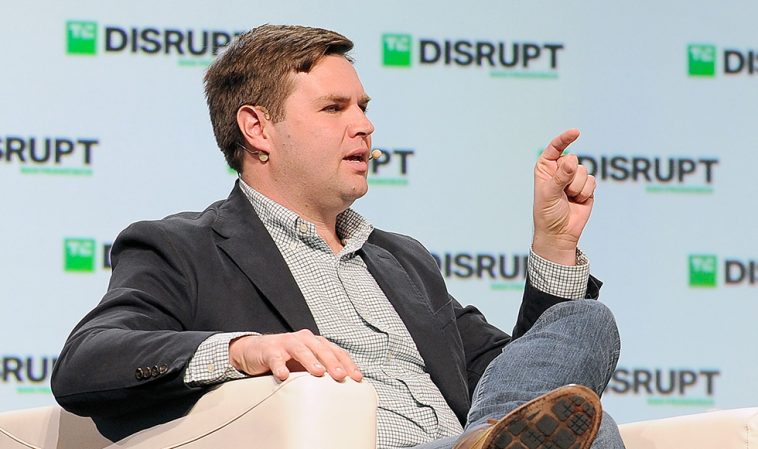Ohio‘s Senator J.D. Vance, a Republican, recently voiced his stance towards Google, expressing his concerns on the tech giant’s dominant control over information. He argues that Google’s reach and influence have become too extensive, advocating for a break-up of the company. In his opinion, the issue of Google’s control over information eclipses other concerns related to the integrity of elections. He characterizes Google as a technology entity with an overt progressive slant.
Vance’s call for action towards Google’s operational model has come after Tim Pool, a notable journalist, shared insights from a media bias watch organization called AllSides. The report discussed the growing ideological slant observable in Google News’s output, particularly following the 2022 midterm elections. According to AllSides’s report, the majority of articles—approximately 63%—originated from media outlets that lean left.
A startlingly small percentage, just 6%, of the stories featured by Google News were sourced from right-leaning outlets. This statistical revelation has raised significant concerns about the balance of perspectives provided by Google News. According to AllSides, unfortunately, this apparent bias isn’t confined solely to Google News, but extends to the tech giant’s primary service as well – its search engine.
AllSides has pointed out that the bias can be seen prominently even in the search results for popular and contentious topics like ‘abortion’ and ‘election’. The majority of results offered by Google’s search engine come from media organizations identified as having a left-leaning orientation. The presence of right-leaning outlets in search results was strikingly lacking, never exceeding 12% for any given term.
The tilt in Google’s platform isn’t just recognized by Vance, but is echoed by industry leaders such as the well-known CEO of Tesla, Elon Musk. Musk is also the proprietor of the social media platform X/Twitter. He criticized Google for what he perceives as ‘troubling programming that borders on being racist and anti-civilization’, specifically calling out Google’s Artificial Intelligence (AI) technology.
Drawing attention to recent backlash against Google, Musk referred to the controversy around Google’s AI platform, Gemini. Gemini was met with disapproval after it generated politically correct, yet historically inaccurate images in response to certain user prompts. Musk viewed this incident as a testament to Google’s ‘anti-civilization’ perspective and applauded the fact that Google’s mishap has now exposed its biases to a wider audience.
In response to the issue raised by prominent writer Douglas Murray of the New York Post about Google’s overreaching push towards lecturing on diversity via AI, Musk nodded his consensus. He extended the concern about Google’s bias from its AI tool, Gemini, to its traditional search function. He emphasized that, unfortunately, the problem does not remain confined to any single platform, but rather, has permeated into multiple areas of Google’s ecosystem.
To reinforce his viewpoint, Musk shared an instance of Google’s problematic tendencies. He demonstrated that when he performed a Google search via his mobile phone, he was met with options that were overwhelmingly in favor of censorship, furthering the narrative of an ideological bias within Google’s algorithm.
Musk’s remarks don’t just signify personal discontent, but highlight the growing industry opinions around Google’s biased approach. Similar to Vance, Musk advocates for a necessary scrutiny of the power Google wields in dictating the narrative of society’s discourse.
The concerns of Vance and Musk join a larger conversation around the responsible use of AI, censorship, and the importance of political neutrality. The points raised underline the pressing need to find a balance between technology’s suggestive power and our human need for a balanced palette of perspectives.
Advocates for both free speech and technological reform might find this point to be a rallying call, a signal to examine the dominance of any single entity in controlling the narrative and shaping public opinion. Such a conversation is critical for maintaining a healthy democratic society.
The bias in Google’s algorithm, whether intentional or not, serves as a reminder of the potential pitfalls of the modern information age, where dominant tech players wield significant control over the information landscape. The stakes are high, and questions about the equitable distribution of information are becoming increasingly relevant.
Vance’s call to break up Google, along with Musk’s criticism, signals a growing apprehension within the conservative community around the unchecked power of dominant tech players. These concerns echo a sentiment that has stretched across the political spectrum: the necessity for checks and balances in the digital realm.
There are complicated questions to be answered and complex solutions to be crafted in order to offer a more balanced and inclusive information landscape. Technology’s influence is omnipresent and it shapes our world in ways we often might not even realize. Upon looking at the thread of discussion initiated by these industry personnel, it poses both a challenge and an opportunity to reexamine our common space—the internet.



